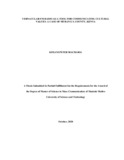Please use this identifier to cite or link to this item:
http://ir-library.mmust.ac.ke:8080/xmlui/handle/123456789/1412Full metadata record
| DC Field | Value | Language |
|---|---|---|
| dc.contributor.author | MACHARIA, KIMANI PETER | - |
| dc.date.accessioned | 2020-11-04T09:43:59Z | - |
| dc.date.available | 2020-11-04T09:43:59Z | - |
| dc.date.issued | 2020-10-05 | - |
| dc.identifier.uri | http://r-library.mmust.ac.ke/123456789/1412 | - |
| dc.description.abstract | Currently, numerous FM stations have mushroomed in Kenya, many of them using vernacular languages in their broadcast. The radio programmescover a variety of topics including politics, business, relationships, lifestyle, family, education, environment and health. However, very few of these programmesspecificallytackle issues related to culture. Limited research has been carried out regarding the place of radio programmes in transmitting cultural values. Westernization and apingof western ways of life has resulted in the distortion of cultural values, family breakups, crime, rape within the family, discord, ethnic animosity and cultural imperialism. In addition, the vernacularFM radio stations are experiencing scarcity in terms of rich local content because of lack of recognition and support from the community and the governmentas a result of modernity. This study consequently sought to examine FM vernacular radio asatool for communicating cultural values to residents of Murang’a County, Kenya. The specific objectives of this study included; firstly, establishingfactors that determine the choice of vernacularFMradio programmes by residents of Murang’a County, to examine the perceptions of audiences to presenters of vernacularFMradio programmes on cultural values, and lastly, determine the efficacy of vernacular FM radio programmes in disseminating cultural values to audiences. The study employed two theories and a conceptual framework namely; Uses and Gratification Theory and the Framing Theory. The research made use of a mixed methodsresearch design. Primary data was obtained using questionnaires, which were administered to a sample of 250 residents of Murang’aCountyand in-depth interviewswhich were conducted amongthree (3) radio presenters of vernacularFM radioprogrammes selected through purposive sampling. Data collected was analyzedboth quantitatively and qualitatively.Quantitative data was analyzedusing descriptive and inferential statisticsandresults presented in tables, pie charts, graphs andpercentagesfollowed by discussions.Qualitative data on the other hand, wastranscribed, translated and presentedthematically. The study found out that vernacularFMradioprogrammes are an effective tool forconveying, maintaining and preserving cultural values in Murang’a County. This is because theresults show that mostof the respondents listen tovernacular FM radioprogrammes. The study recommends thatowners of vernacularFMradiostations should ensure thatprogrammesaired have cultural values as part of the content.In addition, presenters of vernacularFM radioprogrammes should be knowledgeable incultural matters of given communities inorder to present them effectively. | en_US |
| dc.description.sponsorship | MMUST | en_US |
| dc.language.iso | en | en_US |
| dc.publisher | MMUST | en_US |
| dc.subject | Vernacular, FM Radio, Programmes, Tool, Communicating, Cultural, Values. | en_US |
| dc.title | VERNACULAR FM RADIOAS A TOOL FOR COMMUNICATING CULTURAL VALUES: A CASE OF MURANG’A COUNTY, KENYA | en_US |
| dc.type | Thesis | en_US |
| Appears in Collections: | School of Arts and Social Sciences | |
Files in This Item:
| File | Description | Size | Format | |
|---|---|---|---|---|
| MACHARIA KIMANI -THESIS.pdf | 1.5 MB | Adobe PDF |  View/Open |
Items in DSpace are protected by copyright, with all rights reserved, unless otherwise indicated.
